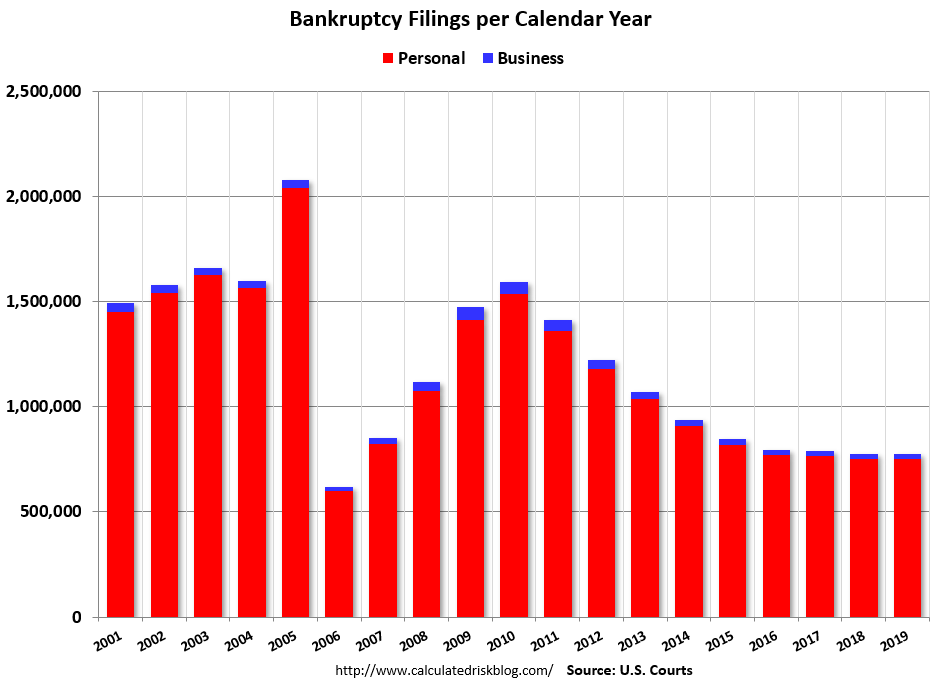Alexandria, Va. — Total commercial chapter 11 filings in January 2020 increased 72 percent over the same period last year, according to data provided by Epiq Systems, Inc. The 630 commercial chapter 11 filings in January 2020 were up from the 366 commercial chapter 11 filings reported in January 2019. Total commercial filings were 3,500 in January 2020, representing an 18 percent increase from the 2,961 business filings recorded in January 2019. Total bankruptcy filings increased 1 percent to 58,126 in January 2020 from the 57,657 filed in January 2019. Consumer filings decreased slightly in January 2020 to 54,626 from the January 2019 consumer filing total of 54,696.
“Debt-burdened businesses and consumers facing tighter lending standards, marketplace challenges and high filing costs need the shelter of bankruptcy's fresh financial start,” said ABI Executive Director Amy Quackenboss. “The Small Business Reorganization Act takes effect on February 19 to provide a better path for Main Street debtors to restructure their debts. Also, the final recommendations of ABI’s Commission on Consumer Bankruptcy provide a blueprint for the courts, Congress and other stakeholders to modernize the Code for consumers wrestling with heavy debt loads.”
To help practitioners and struggling small businesses prepare for the significant changes that the Small Business Reorganization Act of 2019 will make to the Code once effective on Feb. 19, ABI is holding a special webinar on February 11 with a panel of experts who will identify key provisions to be aware of within the new law. Register for free by clicking here: https://www.abi.org/events/whats-the-last-word-on-sbra.
The 630 January 2020 commercial chapter 11 filings were a 61 percent increase over the 391 commercial chapter 11s filed in December 2019. The 3,500 commercial filings in January 2020 were 21 percent more than the 2,895 commercial filings registered in December 2019. Total U.S. bankruptcy filings increased 10 percent in January 2020 from the 53,053 total filings in December 2019. Additionally, consumer filings increased 9 percent in January 2020 to 54,626 from the December 2019 noncommercial filing total of 50,158.
The average nationwide per capita bankruptcy-filing rate in January 2020 was 2.25 (total filings per 1,000 per population), a slight decrease from December 2019’s rate of 2.43. Average total filings per day in January 2020 were 2,768, a 1 percent increase from the 2,746 total daily filings recorded in January 2019. States with the highest per capita filing rates (total filings per 1,000 population) in January 2020 were:
1. Alabama (5.49)
2. Tennessee (5.20)
3. Georgia (4.60)
4. Mississippi (4.22)
5. Arkansas (3.61)
ABI has partnered with Epiq Systems, Inc. in order to provide the most current bankruptcy filing data for analysts, researchers and members of the news media. Epiq Systems is a leading provider of managed technology for the global legal profession.
For further information about the statistics or additional requests, please contact ABI Public Affairs Officer John Hartgen at 703-894-5935 or jhartgen@abiworld.org.
###
ABI is the largest multi-disciplinary, nonpartisan organization dedicated to research and education on matters related to insolvency. ABI was founded in 1982 to provide Congress and the public with unbiased analysis of bankruptcy issues. The ABI membership includes nearly 11,000 attorneys, accountants, bankers, judges, professors, lenders, turnaround specialists and other bankruptcy professionals, providing a forum for the exchange of ideas and information. For additional information on ABI, visit www.abi.org.
Epiq Systems is a leading provider of managed technology for the global legal profession. Epiq Systems offers innovative technology solutions for electronic discovery, document review, legal notification, claims administration and controlled disbursement of funds. Epiq System’s clients include leading law firms, corporate legal departments, bankruptcy trustees, government agencies, mortgage processors, financial institutions, and other professional advisors who require innovative technology, responsive service and deep subject-matter expertise. For more information on Epiq Systems, Inc., please visit http://www.epiqsystems.com.
Wednesday, February 5, 2020


